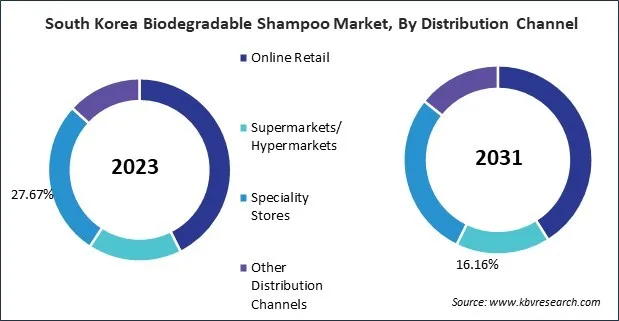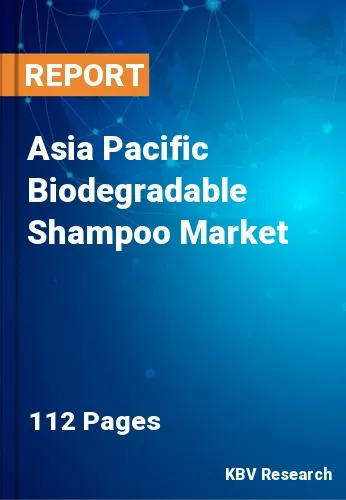The Asia Pacific Biodegradable Shampoo Market would witness market growth of 14.0% CAGR during the forecast period (2024-2031). In the year 2022, the Asia Pacific market's volume surged to 14311.7 Thousand Units (1 Liter), showcasing a growth of 15.8% (2020-2023).
The online retail segment has become a key distribution channel for these shampoos, driven by the increasing popularity of e-commerce and changing consumer shopping habits. Consumers can easily browse a wide range of these shampoo options, read reviews, and compare prices across different brands without leaving their homes. Online platforms also offer the convenience of doorstep delivery, making it a preferred shopping option for many consumers. Thus, the Online Retail Segment in China market consumed a volume of 2198.76 Thousand Units (1 Liter) in 2023.

The China market dominated the Asia Pacific Biodegradable Shampoo Market by Country in 2023, and would continue to be a dominant market till 2031; thereby, achieving a market value of $409.7 Million by 2031. The Japan market is registering a CAGR of 13.3% during (2024 - 2031). Additionally, The India market would showcase a CAGR of 14.8% during (2024 - 2031).
One additional significant factor that is driving this market is the growing emphasis on personalized and targeted hair care solutions. Modern consumers seek eco-friendly products tailored to their hair needs, such as hydration, volume, or color protection. These shampoos have adapted to this demand by offering specialized formulations that address various hair and scalp concerns.
Celebrity and influencer endorsements have played a pivotal role in promoting these shampoos by raising awareness about their environmental benefits and making them aspirational. High-profile advocates like Emma Watson, who supports sustainable personal care, and Jessica Alba, through her brand The Honest Company, have used their platforms to inspire eco-conscious choices among their fans.
Australia’s demand for these shampoos is closely tied to its eco-tourism industry and the country’s strong environmental values. Australian consumers prioritize products with locally sourced ingredients like tea tree oil, eucalyptus, and macadamia, which are abundant in the region’s biodiversity. Brands like A’kin and Ecostore lead the market with these shampoos emphasizing sustainability and cruelty-free practices. The growing popularity of zero-waste stores and refill stations in cities like Sydney and Melbourne has further contributed to the market’s growth. Australia’s eco-tourism operators also integrate these shampoos into their amenities, catering to travelers who value environmentally friendly accommodations. Therefore, with its diverse consumer base and a blend of traditional and modern influences, Asia Pacific is poised to become a major player in the biodegradable shampoo market.
Free Valuable Insights: The Global Biodegradable Shampoo Market is Predict to reach USD 5.23 Billion by 2031, at a CAGR of 13.3%
Based on Gender, the market is segmented into Female and Male. Based on Distribution Channel, the market is segmented into Online Retail, Supermarkets/Hypermarkets, Speciality Stores, and Other Distribution Channels. Based on End User, the market is segmented into Individual and Commercial. Based on countries, the market is segmented into China, Japan, India, South Korea, Australia, Malaysia, and Rest of Asia Pacific.

By Gender (Volume, Thousand Units (1 Liter), USD Billion, 2020-2031)
By Distribution Channel (Volume, Thousand Units (1 Liter), USD Billion, 2020-2031)
By End User (Volume, Thousand Units (1 Liter), USD Billion, 2020-2031)
By Country (Volume, Thousand Units (1 Liter), USD Billion, 2020-2031)
Our team of dedicated experts can provide you with attractive expansion opportunities for your business.

